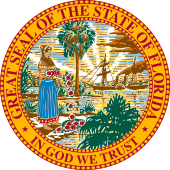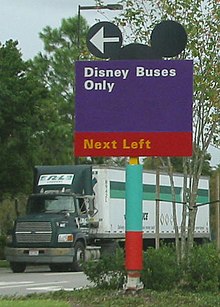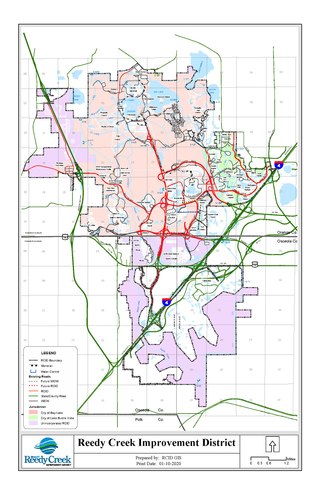
The Central Florida Tourism Oversight District (CFTOD), formerly the Reedy Creek Improvement District (RCID), is the governing jurisdiction and special taxing district for the land of Walt Disney World Resort. It includes 39.06 sq mi (101.2 km2) within Orange and Osceola counties in Florida. It acts with most of the same authority and responsibility as a county government. It includes the cities of Bay Lake and Lake Buena Vista, as well as unincorporated land.

The Walt Disney World Resort, also called Walt Disney World or Disney World, or simply abbreviated WDW, is an entertainment resort complex in Bay Lake and Lake Buena Vista, Florida, United States, near the cities of Orlando and Kissimmee. Opened on October 1, 1971, the resort is operated by Disney Parks, Experiences and Products, a division of The Walt Disney Company. The property covers nearly 25,000 acres, of which half has been used. The resort comprises four theme parks, two water parks, 31 themed resort hotels, nine non-Disney hotels, several golf courses, a camping resort, and other entertainment venues, including the outdoor shopping center Disney Springs.
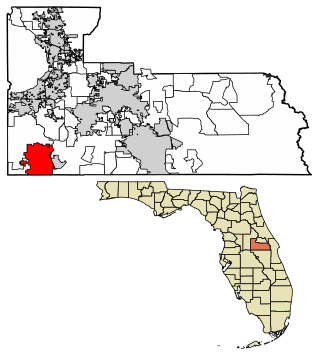
Bay Lake is a city in Orange County, Florida, United States. The population was 29 at the 2020 census. It is named after a lake that lies east of the Magic Kingdom. All four of the Walt Disney World Resort theme parks, and one of Walt Disney World's two water parks, are in Bay Lake, though all Disney parks in the region have mailing addresses in nearby Lake Buena Vista.

Lake Buena Vista is a city in Orange County, Florida, United States. It is mostly known for being the mailing address for Walt Disney World—although almost all of the resort facilities, including all four theme parks, are physically located in the adjacent city of Bay Lake. It is one of two Florida municipalities inside the Central Florida Tourism Oversight District, which also contains Walt Disney World, the other being Bay Lake. The permanent residential population of Lake Buena Vista was 24 at the 2020 census.

Reedy Creek Energy Services (RCES) is a wholly owned subsidiary of The Walt Disney Company. It operates the electric and other utility transmission and distribution systems of the Reedy Creek Improvement District (RCID) on behalf of the district which specifically covers Walt Disney World outside Orlando, Florida. Some power is produced by the district-owned power plant north of the Magic Kingdom with the remainder purchased from the public power grid. Officially the utility systems are owned by the district entity itself and the district "contracts" with RCES to operate the systems.

There are relatively few private highways in the United States, compared to other parts of the world.

Lesbian, gay, bisexual, and transgender (LGBT) people in the U.S. state of Florida face legal challenges not experienced by non-LGBT people. Same-sex sexual activity became legal in the state after the U.S. Supreme Court's decision in Lawrence v. Texas on June 26, 2003, and same-sex marriage has been legal in the state since January 6, 2015. Discrimination on account of sexual orientation and gender identity in employment, housing and public accommodations is outlawed following the U.S. Supreme Court's ruling in Bostock v. Clayton County. In addition, several cities and counties, comprising about 55 percent of Florida's population, have enacted anti-discrimination ordinances. These include Jacksonville, Miami, Tampa, Orlando, St. Petersburg, Tallahassee and West Palm Beach, among others. Conversion therapy is also banned in a number of cities in the state, mainly in Palm Beach County and the Miami metropolitan area.

Ronald Dion DeSantis is an American politician serving since 2019 as the 46th governor of Florida. A member of the Republican Party, he represented Florida's 6th congressional district in the U.S. House of Representatives from 2013 to 2018. DeSantis is a candidate in the 2024 United States presidential election.

Jerry L. Demings is an American politician and former law enforcement officer serving as Mayor of Orange County, Florida, in office since 2018. A Democrat, he previously served as Sheriff of Orange County, Florida, from 2009 to December 2018, and served as Chief of the Orlando Police Department and Director of Public Safety for Orange County, Florida. He was elected Mayor of Orange County in August 2018, becoming the first Democrat and first African American to be elected to that office.
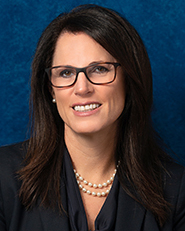
Tina Scott Polsky is an American politician serving as a Democratic member of the Florida Senate, representing the 29th district since 2020. Her Senate district includes parts of southern Palm Beach and northern Broward counties. Polsky also served one term in the Florida House of Representatives, representing parts of western and southern Palm Beach County from 2018 to 2020.

Fentrice DeNell Driskell is an American attorney and politician who is the Representative in the Florida House of Representatives from the 67th House district in Hillsborough County. She is Of Counsel at the law firm of Carlton Fields. A Democrat, she is minority leader in the Florida House of Representatives.

Anna Vishkaee Eskamani is an American politician who is the member of the Florida House of Representatives from the 47th district in Orange County from 2018. She is the first Iranian American in the Florida legislature. Eskamani is a member of the Democratic Party supporting abortion rights, increased gun control, increasing expenditures on public education, and increasing environmental regulations such as a banning plastic bags. Anna Eskamani is a leading candidate for the Democratic nomination for Governor of Florida in 2026.
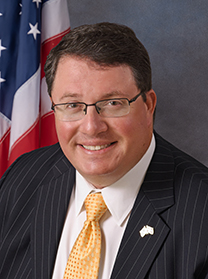
Randy Fine is an American Republican politician, activist, and former gambling industry executive who was first elected to the Florida House of Representatives in 2016. His district covers southern Brevard County.

Michele Kenyette Rayner-Goolsby is an American attorney and politician. She has served as a member of the Florida House of Representatives since 2020, representing District 62 in Pinellas and Hillsborough Counties. She was the first openly lesbian black woman elected to the Florida Legislature, originally representing House District 70.

Robin Bartleman is an American legislator and educator serving as a member of the Florida House of Representatives from the 103rd district. She assumed office on November 3, 2020. She is a Democrat, supporting affordable housing, resolving the state's property insurance crisis, dealing with flooding and increasing healthcare affordability.
Since the passage of Florida's Parental Rights in Education Act, commonly known as the Don't Say Gay bill, The Walt Disney Company has been involved in a feud with Florida governor Ron DeSantis and the state's Republican Party. While initially a donor to some of the politicians who voted in favor of the Act, after its passage Disney spoke out against the bill and called for it to be repealed.

The Parental Rights in Education Act, commonly referred to as the "Don't Say Gay" law, is a Florida state law passed in 2022 that regulates public schools in Florida. The law is most notable for its controversial sections which prohibit public schools from having "classroom discussion" or giving "classroom instruction" about sexual orientation or gender identity from kindergarten through third grade or in any manner deemed to be against state standards in all grades; prohibits public schools from adopting procedures or student support forms that maintain the confidentiality of a disclosure by a student, including of the gender identity or sexual orientation of a student, from parents; and requires public schools to bear all the costs of all lawsuits filed by aggrieved parents.

The Stop the Sexualization of Children Act was United States federal legislation introduced in the 117th Congress which would prohibit all federally-funded institutions from using such funds to instruct children on "sexually-orientated" materials. Considered to be a national version of the Florida Parental Rights in Education Act, likewise to the Florida legislation, it has been described as the national Don't Say Gay bill by opponents and commentators. The bill was introduced by Republican Representative Mike Johnson of Louisiana, and 32 additional Republican members of Congress cosponsored the bill.

The Parental Rights Over the Education and Care of Their Kids Act is pending United States legislation introduced in both the House of Representatives and Senate of the 118th congress. Sponsored by Republican representative Tim Walberg and senators Rick Scott of Florida and Tim Scott of South Carolina and originating in the 117th congress, the bill is similar to and viewed of as a national version of the Florida Parental Rights in Education Act, itself known by its opponents as the Don't Say Gay bill.
Disney v. DeSantis is a lawsuit brought against Florida governor Ron DeSantis by the Parks, Experiences and Products division of The Walt Disney Company in 2023 in the United States District Court for the Northern District of Florida. The case, filed by Disney, claims that DeSantis, alongside Florida Department of Economic Opportunity acting secretary Meredith Ivey, and the Central Florida Tourism Oversight District board violated the company's first amendment rights by using political power for government retaliation purposes.
